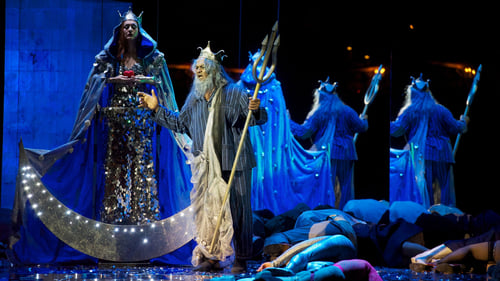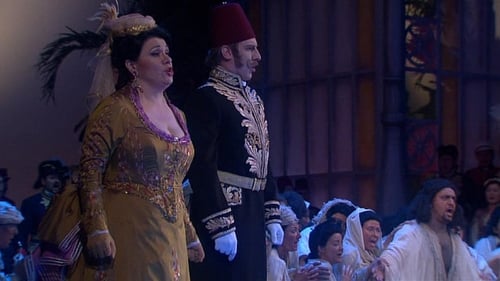
Conductor
Accompanied by a luxurious team of professionals, consisting of the renowned stage director Peter Stein, his stage designer Ferdinand Wöger and conductor Ádám Fischer, Teatro alla Scala presents with Mozarts Zauberflöte a production where orchestra, chorus, soloists as well as outfitters all consisted of students of the Academia Teatro alla Scala, the educational institution aimed to train the young talents, founded by the Teatro alla Scala in 2001. The result was more than stunning and an instant success with the audience of the ten sold out performances at La Scala, which is famous for its more than critical loggionisti. According to Die Presse, Fischer gets the best out of the Academy Orchestra with delicate execution and humane phrasing while the Frankfurter Allgemeine Zeitung praises Fatma Said as "Pamina" and Yasmin Özkan as "Queen of the Night".

Music Director
Antonin Dvorak’s next to last opera draws its substance from the underwater wonderland of little mermaids, Undines and Melusines: the water nymph Rusalka falls hopelessly in love with a prince and, although she is willing to sacrifice her voice to acquire the human form she needs in order to stay with him, the disparity between them proves to be too great. Jaroslav Kvapil’s libretto inspired Dvorak to compose a masterpiece, a compelling opera full of poignant lyricism and dramatic twists. Ádám Fisher and Stefan Herheim masterfully presented this ‘lyrical fairytale’ at La Monnaie in 2008. In this widely acclaimed interpretation, the fairytale elements sometimes assume frighteningly realistic dimensions so that one might see this enchanting production as a psychoanalytical study of male fantasies and female archetypes.

Conductor

Conductor
German director Claus Guth´s Mozart-Da Ponte trilogy was concluded at the 2009 Salzburg Festival with Cosí fan tutte featuring a starry cast including Miah Persson, Bo Skovhus, Isabel Leonard as well as Patricia Petibon. Adam Fischer conducts the Vienna Philharmonics.
Those familiar with Claus Guth´s previous work such as the psychoanalytic Nozze di Figaro, the Don Giovanni set amongst junkies in a wood in the middle of the night, the Ariadne who commits suicide on Naxos, Richard Wagners Tristan in love with Mathilde Wesendonck and a Walküre set in a miniature dolls house will know better than to expect a bubbly Mozartian comedy.

Conductor
The most annoing things about this production is that the actors, Voyager I and II, spoke most of the recitatives as the singers on the most part were making hand jestures to go along with the spoken words, and the Voyagers' weird distracting seizure movements, jestures and bodyslamming themselves to the ground while the singers sang. It's amazing how the singers could focus on their arias and keep their composure.

Music Director
The Zurich Opera presents a stunning new production of Verdi’s most popular, most spectacular work. Responding superbly to the role, Swedish soprano Nina Stemme – she of the richly clear voice – offers an Aida vibrant with love and emotion. Heading a magnificent cast, she makes a poignant couple with talented tenor Salvatore Licitra as Radamès. Luciana d’Intino is nothing less than brilliant in the role of Aida’s rival Amneris and Juan Pons imbues his Amonasro with enormous humanity. Conducting the Zurich Opera orchestra and chorus, Adam Fischer brings out all the score’s musical and dramatic majesty.

Conductor
The opera: Nina, o sia La Pazza Per Amore itself, is an extra-ordinary sad and touching story, and seems very difficult to be performed if the singer has no acting talents. Therefore we adore Cecilia Bartoli for the magnificent performance as the crazy Nina who lost her mind totally. Her magnificent singing, we don't doubt at all, but her acting is amazingly such that it expressed a real situation of a girl becoming crazy and losing her mind caused by painful incidents in her love life. It is also supported by the other singers who are singing matching as perfectly and splendidly as the diva Cecilia Bartoli, especially the baritone Laszlo Polgar with his deep rich voice as the cruel father who has remorse and came back to see his daughter Nina and the young tenor Jonas Kauffmann with his clear light voice, resulting in a surprisingly beautifully performed opera.

Conductor
Acclaimed soprano Edita Gruberova stars as the title character in this 1996 production of Gaetano Donizetti's "Linda di Chamounix," featuring the Orchestra and Chorus of the Zurich Opera House under the direction of conductor Adam Fischer. Secretly in love with Viscount Carlo, Linda goes mad when she learns a marriage to another woman has been arranged for him. Jacob Will and László Polgár also star.

Conductor
Recorded live at the Vienna State Opera, Placido Domingo and Eva Marton star in a sumptuous recording of Ponchielli's famed four-act melodrama, a story of tyranny and intrigue set in semi-historical and ever-romantic Venice. The action is projected by strong characters whose fundamentally sound instincts become distorted by raw passion. The performance draws upon both human and technical resources including a large ballet and varies in mood from the happy carnival to scenes of the darkest gloom and horror.

Conductor
The sets and costumes by Ponnelle are truly reflective of the 'grand style'. Plus the fact that the two lead characters are portrayed by top singers in their absolute prime - both Gruberova and Araiza weren't even 35 years old at the time of this performance, makes this production the most convincing both dramatically and musically. The conducting of Fischer is good - he makes the music come alive, much more so than the MET version.

Conductor
Every bar bubbles with the spirit of the Bohemian countryside in Otto Checnk's picturesque 1982 production from Vienna, where Smetana's comic masterpiece first conquered the heart of opera lovers with its lilting melodies, lovable characters and rousing Czech folk dances. This colourful, beautifully sung performance features legendary Czech soprano Lucia Popp and German tenor Siegfried Jerusalem. Filmed live at the Wiener Staatsoper in 1982, the appearance of the townsfolk, wearing their traditional Bohemian costumes, exuberantly singing and dancing, serves to quickly draw us into the early 1870s and this engaging comedy of love nearly thwarted but ultimately triumphant.









